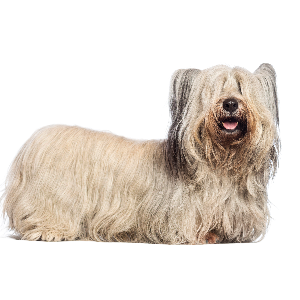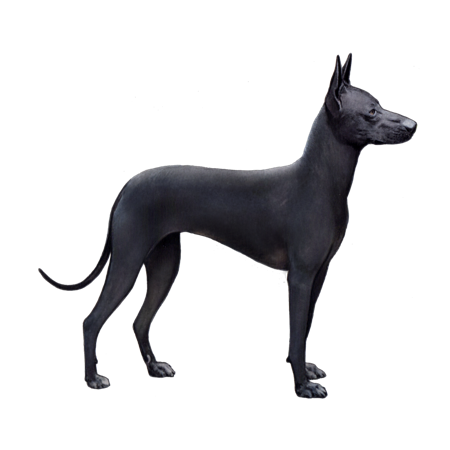
Skye Terrier
An intelligent, sensitive, and calm breed, the Skye Terrier has lots of character. These playful dogs tend to be very affectionate toward family and love exploring the outdoors. That said, they don't require much exercise and will happily relax at home with their people.
Interested in discovering if your dog is a Skye Terrier?
Check out Wisdom Panel's DNA tests.

Skye Terrier Traits
General Appearance
Skye Terriers are agile, sturdy, muscular little dogs with long coats that cascade down their bodies.
Coat and Coloring
The Skye Terrier's long double-coat may be shades of black, silver, gray, fawn, or cream. The back and tips of the dog's ears may be black or a darker shade. A small white chest blaze is possible in this breed.
Distinctive Physical Traits
The Skye Terrier is known for its abundant coat that completely covers its long, low body.
Skye Terrier Temperament
Skye Terriers are alert, intelligent, and fearlessly independent. Because of their hunting background, they may bark, dig, or chase wildlife. They can also be difficult to disengage from an activity.
Skye Terriers are sometimes reserved around strangers and may not get along with other dogs. And they often require careful training and socialization to prevent them from developing small dog syndrome (when little dogs become overly dominant). Otherwise, they might constantly bark, nip at strangers, or challenge your authority.
That said, these dogs make wonderful family pets with a little work.


Skye Terrier History
The Skye Terrier has been around for more than four centuries—making it one of the oldest terrier breeds. Likely originating on the Isle of Skye, this breed existed only in northwestern Scotland for many years. The Skye Terrier was often used for hunting otter and fox. These petite dogs could squeeze into small spaces to flush out prey.
In 1840, Queen Victoria began breeding both the drop-eared and prick-eared varieties in her royal kennels. This caused the breed to gain popularity, especially among the nobility. In 1887, the American Kennel Club recognized the Skye Terrier, which quickly became a favorite at dog shows.
Skye Terrier Care
Nutrition
Skye Terriers need a high-quality, age-appropriate diet—whether it's commercially manufactured or homemade (under a veterinarian's supervision and approval).
To prevent weight-related health problems, monitor how much your Skye Terrier eats, and reduce portions if necessary. Also, remember that giving too many treats can contribute to obesity.
Grooming
The flowing double-coat of the Skye Terrier may look like it would be hard to manage. But a weekly brushing and combing is all that's required to keep your pup looking good.
Monthly baths, nail trims, and ear cleanings are also integral to a comprehensive grooming routine. And all dogs need regular dental care, which should include teeth brushing.
Exercise
Skye Terriers don't need much exercise. A short daily stroll is typically sufficient to keep them healthy. That said, this breed also seems to enjoy dog sports—such as earthdog trials, agility, and tracking.
Training
A sensitive but strong-willed breed, the Skye Terrier doesn't respond well to harsh discipline. But consistent positive reinforcement and a gentle tone will help this dog become the faithful and loving pet it can be.
Skye Terriers have a strong prey drive and will chase squirrels and other little critters if you let them. Basic obedience training can help curb this desire. And early socialization will help your pup grow up to be a well-mannered companion.

Skye Terrier Genetic Health Conditions
-
Chondrodystrophy (CDDY) and Intervertebral Disc Disease (IVDD) Risk
Chondrodystrophy (CDDY) is a skeletal disorder characterized by shortened limbs and abnormal early degeneration of the spinal discs, or intervertebral disc disease (IVDD), which predisposes to disc herniation.
Knowing if your Skye Terrier is a carrier or at-risk for these conditions can help you and your veterinarian plan for your pup’s lifelong care. With Wisdom Panel™ Premium, you can get results for over 200 genetic health tests.
Breed Group
Terrier
The Terrier Group ancestors were bred to hunt and kill vermin. They are often characterized as feisty and energetic dogs whose sizes range from fairly small to much larger.
Resources
https://www.google.com/books/edition/Skye_Terrier/9toKBgAAQBAJ
https://www.akc.org/dog-breeds/skye-terrier/
Reviewed July 26, 2020 by Annette Louviere, DVM





















































